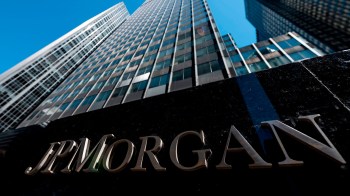Is it possible to predict what’s "too big to fail"?
TEXT OF STORY
Kai Ryssdal: You heard Leigh Gallagher a minute ago putting bank profits in context. Why set aside more for losses when you know there’s a bailout coming? Too big to fail is another way of saying that. And it seems we’re back to the same question we were bumping up against in the middle of the financial crisis. What exactly is “too big to fail”?
Next week a new government panel’s supposed to come up with a list of what’re called “systemically important financial institutions.” Here’s the thing, though. Treasury Secretary Timothy Geithner — the guy who’s going to head the panel — wonders whether coming up with that list is even possible.
Here’s our senior business correspondent Bob Moon.
Bob Moon: The reforms pushed through the last Congress by Democrats Christopher Dodd and Barney Frank envisioned tighter regulatory attention on institutions deemed vital to the financial system. The law leaves it up to regulators to actually identify those special cases, and Christopher Whalen of Institutional Risk Analytics says therein lies the dubious rub.
Christopher Whalen: Congress mandated to the regulators that they should prevent systemic risk, but that’s just not a reasonable request.
Treasury Secretary Geithner apparently agrees. He’s quoted in a federal inspector-general’s report as saying, identifying risk “depends too much on the state of the world at the time.” And he adds, “You won’t be able to make a judgment about what’s systemic and what’s not until you know the nature of the shock.”
But like it or not, the new law requires some kind of definition, according to Karen Petrou of Federal Financial Analytics.
Karen Petrou: He has little discretion. He has to name names. The law requires that that be done.
Petrou isn’t expecting a long list from Geithner’s task force, but a focus on the most visible financial giants.
Petrou: It’s like, you know, the Supreme Court’s decision that you can’t define obscenity, you know it when you see it? And I think this is going to be the same test for systemic risk — you know it when you see it in its most obvious form. Say a Fannie Mae, Freddie Mac, the very biggest of the big. And those are the first firms that are going to be named.
Which Christopher Whalen says still leaves our financial future uncertain.
Whalen: Particularly when you’re talking about the interaction in a still reasonably free market, where you do have unanticipated events, you’re always going to have the possibility of a meltdown.
Whalen says the government can try to impose safeguards. But he says Geithner is simply pointing out the government can’t predict whether financial institutions will do something stupid in the future. And Whalen argues that uncertainty has always been vital to maintaining a healthy free market.
I’m Bob Moon for Marketplace.
There’s a lot happening in the world. Through it all, Marketplace is here for you.
You rely on Marketplace to break down the world’s events and tell you how it affects you in a fact-based, approachable way. We rely on your financial support to keep making that possible.
Your donation today powers the independent journalism that you rely on. For just $5/month, you can help sustain Marketplace so we can keep reporting on the things that matter to you.


















